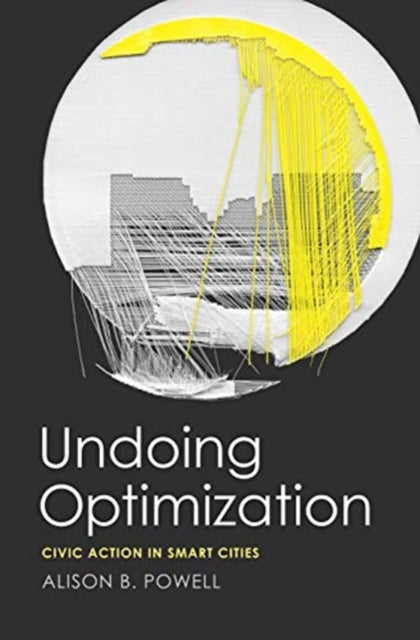Alison B Powell
Undoing Optimization: Civic Action in Smart Cities
Undoing Optimization: Civic Action in Smart Cities
YOU SAVE £0.44
- Condition: Brand new
- UK Delivery times: Usually arrives within 2 - 3 working days
- UK Shipping: Fee starts at £2.39. Subject to product weight & dimension
Bulk ordering. Want 15 or more copies? Get a personalised quote and bigger discounts. Learn more about bulk orders.
Couldn't load pickup availability
- More about Undoing Optimization: Civic Action in Smart Cities
Alison Powell's book explores the civic use, regulation, and politics of communication and data technologies, arguing that the de facto forms of citizenship that emerge represent sites of contention over governance and civic power. She explains how citizenship shifts in response to technological change, particularly in "smart cities" with pervasive sensing, big data, and surveillance.
Format: Hardback
Length: 224 pages
Publication date: 04 May 2021
Publisher: Yale University Press
City life has undergone a profound transformation due to our increasing reliance on communication, data, and sensing technologies. In her insightful book, Alison Powell delves into the civic use, regulation, and politics of these technologies, exploring how governments, planners, citizens, and activists perceive and expect them to enhance urban life. Powell argues that the de facto forms of citizenship that emerge in relation to these technologies serve as focal points of contention regarding the appropriate operation of governance and civic power. As the world becomes increasingly urbanized and polarized, these sites assume heightened significance in addressing the challenges of local participation and engagement.
Powell's approach departs from the traditional dichotomy of top-down versus bottom-up civic action, instead emphasizing how citizenship evolves in response to technological change, particularly in the context of pervasive sensing, big data, and surveillance in "smart cities." She examines how these technologies shape the ways in which individuals engage with their urban environments, their communities, and the government. Through a comprehensive analysis, Powell sheds light on the complex dynamics and tensions that arise as these technologies intersect with issues of privacy, security, equity, and democracy.
One of the key themes of the book is the role of technology in reshaping the boundaries of public and private spaces. Powell argues that the proliferation of sensors, cameras, and data collection devices in cities has blurred the lines between public and private realms, leading to concerns about surveillance, privacy, and the erosion of individual autonomy. She explores how citizens navigate these challenges and advocate for policies that protect their rights and freedoms while also promoting the responsible and ethical use of technology.
Another important aspect of Powell's book is the impact of technology on urban planning and governance. She examines how governments and policymakers use data and sensing technologies to inform decision-making processes and improve the efficiency and effectiveness of urban services. However, she also raises concerns about the potential biases and inequalities that can arise from the use of big data and algorithmic decision-making, particularly in marginalized communities. Powell advocates for a more inclusive and democratic approach to urban planning that involves community participation and engagement at all stages of the process.
Powell's book also explores the role of technology in promoting civic engagement and participation. She examines how social media, mobile apps, and other digital platforms have enabled citizens to connect, organize, and advocate for their interests. However, she also highlights the challenges of information overload, disinformation, and the need for digital literacy and media literacy to navigate the complex landscape of online communication.
In conclusion, Alison Powell's book offers a comprehensive and thought-provoking examination of the civic use, regulation, and politics of communication and data technologies. Through her insightful analysis, Powell sheds light on the complex dynamics and tensions that arise as these technologies intersect with issues of governance, privacy, equity, and democracy. The book provides valuable insights for policymakers, practitioners, and citizens alike, as we navigate the rapidly evolving landscape of urban technology.
Weight: 414g
Dimension: 149 x 223 x 24 (mm)
ISBN-13: 9780300223804
This item can be found in:
UK and International shipping information
UK and International shipping information
UK Delivery and returns information:
- Delivery within 2 - 3 days when ordering in the UK.
- Shipping fee for UK customers from £2.39. Fully tracked shipping service available.
- Returns policy: Return within 30 days of receipt for full refund.
International deliveries:
Shulph Ink now ships to Australia, Belgium, Canada, France, Germany, Ireland, Italy, India, Luxembourg Saudi Arabia, Singapore, Spain, Netherlands, New Zealand, United Arab Emirates, United States of America.
- Delivery times: within 5 - 10 days for international orders.
- Shipping fee: charges vary for overseas orders. Only tracked services are available for most international orders. Some countries have untracked shipping options.
- Customs charges: If ordering to addresses outside the United Kingdom, you may or may not incur additional customs and duties fees during local delivery.


